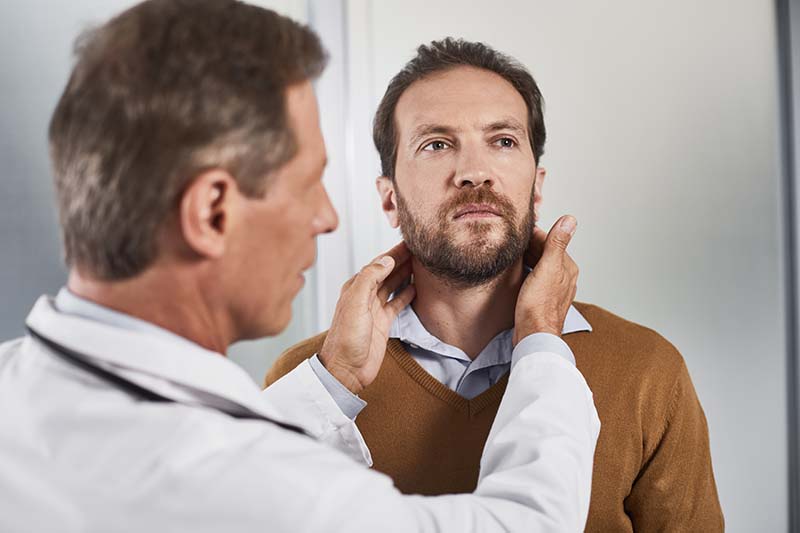What Are the Signs of Lymphoma?
5 min read

If you’ve noticed a lump in your neck, under an arm, or in the groin area it’s a good idea to monitor it and check for other symptoms of a blood cancer called lymphoma. Many of the symptoms of lymphoma can be similar to a cold, COVID, or the flu. Some of the symptoms of lymphoma can also be caused by rheumatoid arthritis or psoriasis. If you’ve noticed anything unusual and you’re feeling run down, it’s best to schedule an appointment with your doctor to look into this further.
Not all lymphoma patients get lumps, although it’s an easy symptom to spot. Let’s take a look at the different signs of lymphoma.
Why Does Lymphoma Cause Lumps?
Lymphoma is a type of cancer that affects the body’s natural cleansing process called the lymphatic system that’s used to fight infections. The lymphatic system includes lymph nodes, the spleen, the thymus gland, and bone marrow. You have a lot of lymph nodes in the neck, under the arm, and in the groin areas. When the lymphocytes, the cells used to fight infection, become cancerous they may start to harden and develop lumps in the neck or other areas where there are a lot of lymph nodes.
What Do Lymphoma Lumps Feel Like?
Just because there’s a lump, it does not mean you have cancer! There can be several causes of a swollen lymph node such as a cold, the flu, or a fatty cyst.
A lymphoma lump will tend to be painless and feel rubbery when touched. Swollen lymph nodes caused by other conditions like the flu can make your lymph nodes swell and feel tender when touched. A lymphoma lump also tends to be movable under the skin versus hard and unmovable.
Lumps can appear in multiple locations on the body at once and in groups. These can show up throughout several years or can occur within just a few days.
Other Symptoms of Lymphoma Besides a Lump
There are some other symptoms of lymphoma that can be similar to a virus like the cold or COVID. However, these symptoms won’t just go away like they do when you’re sick.
One of the most common signs of lymphoma is feeling exhausted. Your body is working hard to keep up its immune response. This type of fatigue isn’t fixed by getting a good night’s rest. It’s persistent, ongoing fatigue. Some other common signs and symptoms include:
- Difficulty catching your breath
- Fever for no explainable reason
- Weight loss without explanation
- Itchy skin
- Night sweats
- Decreased appetite
- Feeling full or bloated for no apparent reason
- Getting frequent infections
If these symptoms are caused by lymphoma, they may vary based on the type of lymphoma. Be sure to discuss any symptoms with your physician to rule out other potential causes, such as menopause or general illness.
The Type of Lymphoma Affects Your Symptoms and Treatments
There are several types of lymphoma, which may affect how you feel. Your diagnosis will tell the oncologist more about which parts of the body are being most affected and how the cancer is spreading. There are over sixty lymphoma subtypes, so identifying the correct type is very important so that the optimal treatment can be prescribed.
There are two broad categories of lymphoma:
Hodgkin Lymphoma
This type of lymphoma is attributed to something called the Reed-Sternberg cell. These are cells in lymph fluid that are found under the nucleus. It often occurs in lymph nodes throughout the body, typically in the upper part, such as the neck, chest, or armpits. It spreads in a progressive pattern that moves from one node to the next. Since progression is predictable, it is fairly easy to treat and catch.
The symptoms of Hodgkin lymphoma are also more systemic such as itchiness, rashes, fever, progressive weight loss, etc. If this type of cancer has also affected the bone marrow you’re likely to also notice shortness of breath, frequent infections, and even bleeding problems such as nosebleeds or tiny blood spots under the skin.
Non-Hodgkin Lymphoma
There are many subtypes of non-Hodgkin lymphoma. Some types grow very slowly, called low-grade, and don’t cause a lot of the system symptoms like fever, infections, and night sweats. Because of this, sometimes non-Hodgkin lymphoma goes undiagnosed for a long time making it harder to treat. Low-grade lymphoma also tends to come and go with treatments needed periodically over the course of the patient’s life.
High-grade non-Hodgkin lymphomas are sometimes also called aggressive because the cells grow faster than low-grade lymphoma. This also means symptoms are more noticeable. Treatments are often successful for these patients because they can be started rather quickly after symptoms begin.
When Should I See a Doctor?
Lumps are a telltale sign and if it’s caused by a virus they should go back to normal in a week or two. If you have a lump that’s not going away or you're experiencing any of the above symptoms, especially in combination with one another, you should set up a visit with your physician.
Typically, a doctor will initially complete a physical exam to look for swelling or anything out of the ordinary. They will also run some blood tests to see if there are signs of lymphoma or another blood condition that could be causing symptoms.
A biopsy (removal) of the lump may be taken and sent to a laboratory. They will analyze the sample to look for any cancerous cells or indications of what it could be.
How is Lymphoma Treated?
Thankfully lymphoma is a highly treatable condition for most patients, especially if caught early. For some patients with low-grade non-Hodgkin lymphoma, active surveillance is the first step before treatment begins. You’re under the care of an oncologist who will determine when it’s a good time to start treatment so that it’s most effective.
📖 Related Read: Old Wisdom and New Advancements in Lymphoma Treatment
Common lymphoma treatments include surgery to remove the cancerous lump, chemotherapy, and now immunotherapy. Extensive research is underway to expand the use of immunotherapy for lymphoma patients, enabling the patient’s own immune system to fight off the cancer cells.
Rocky Mountain Cancer Centers offers clinical research trials to lymphoma patients who qualify, giving access to the most recent and advanced cancer treatments close to home.
Colorado’s Blood Cancer Experts
Lymphoma should be taken seriously. If you find a lump that doesn’t go away on its own in a week or two, or if you notice other symptoms along with a lump, schedule a doctor’s appointment and be upfront about what you’ve noticed.
The earlier lymphoma is found, the better the treatment outcomes. If you have been diagnosed with lymphoma, request an appointment at one of our Colorado cancer centers. We will guide you through your diagnosis, treatment plan, and how to manage life with cancer.
